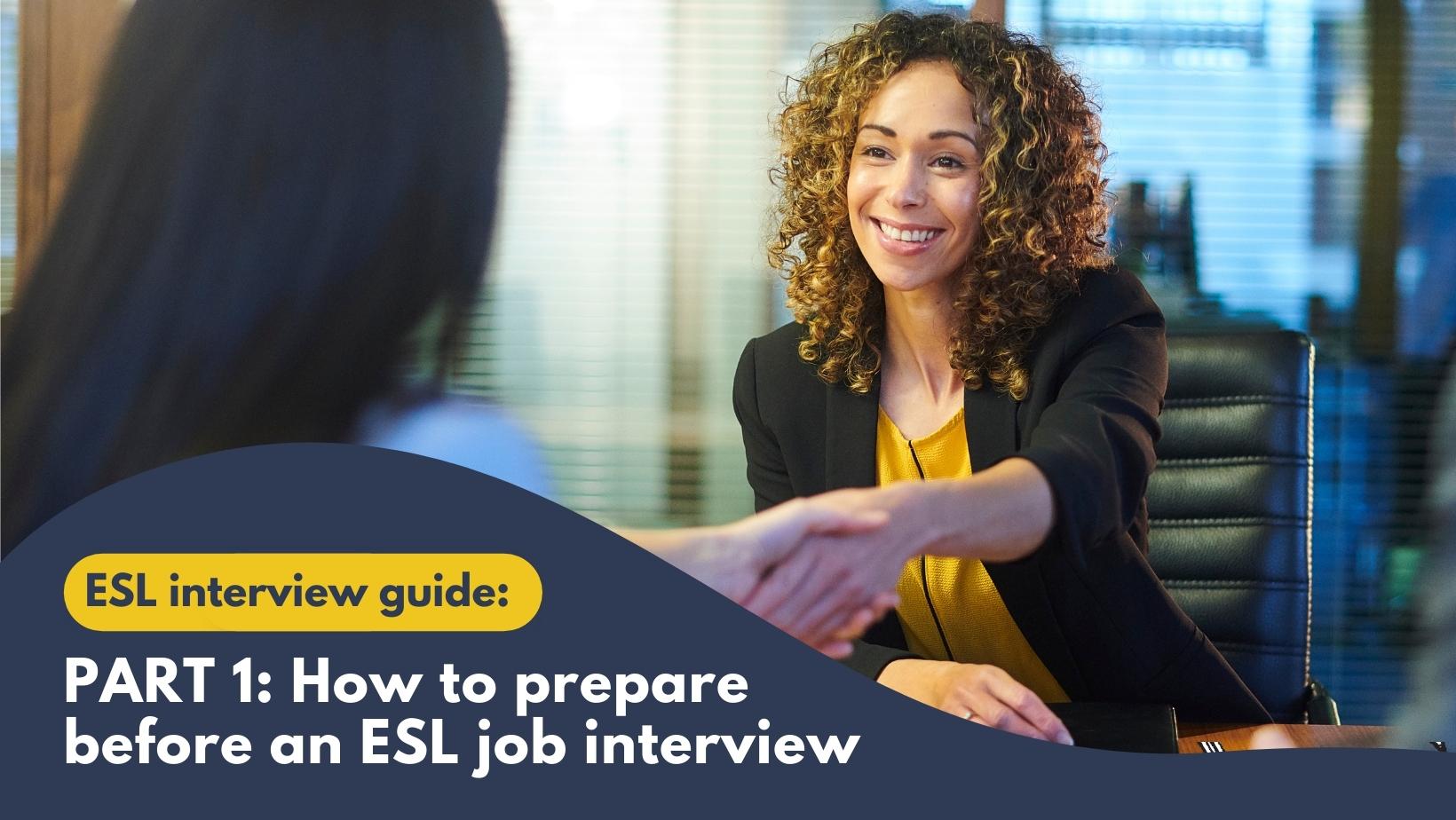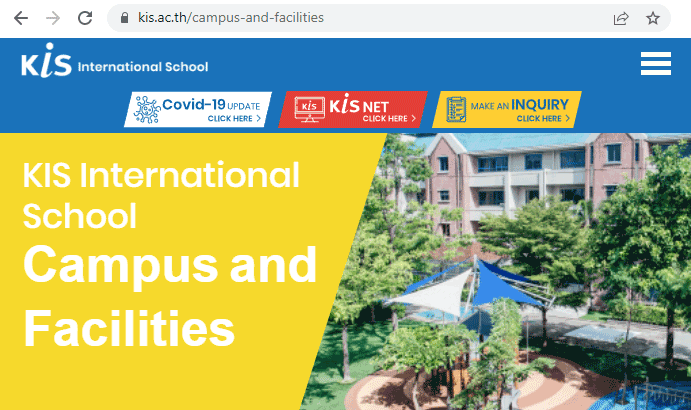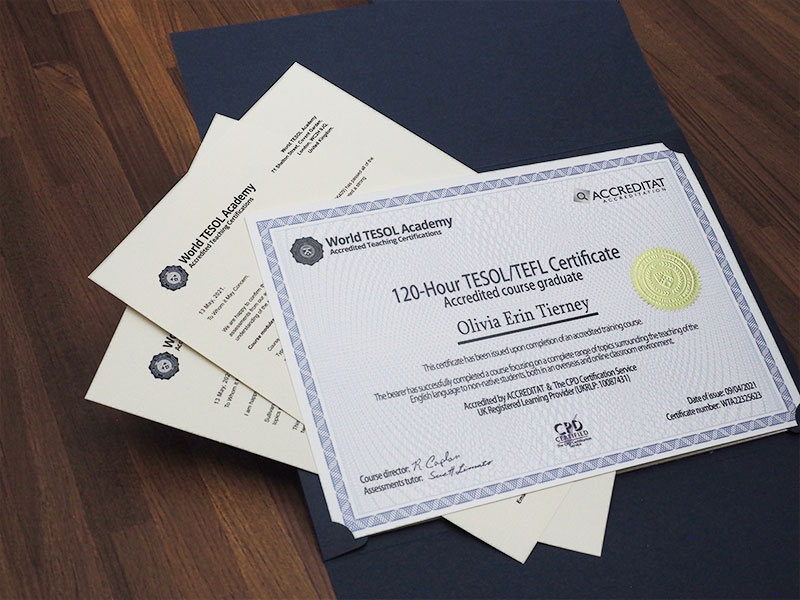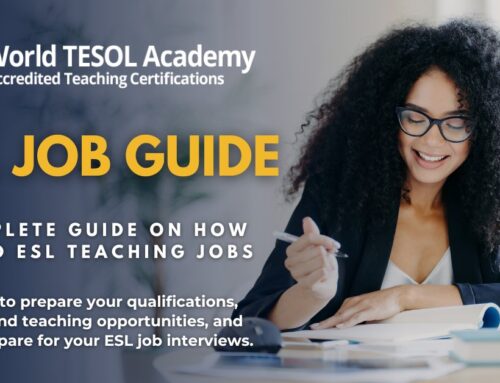
ESL Interview Guide: How to Prepare Before an Interview (Part 1 of 2)
Preparation before your interview is crucial if you wish to truly land your dream teaching job. Unfortunately, many teachers fail to prepare thoroughly enough and find themselves dealing with rejection.
In this two-part guide, we’ll first look at how to prepare for an interview with a school and then look at how to wow your interviewers when you finally meet them.
This isn’t always easy to do, but if you invest some time into preparation, your chances of acing the interview and receiving a job offer are going to increase dramatically.
Part 1: Preparing for interviews
1. Initial preparations
2. Researching your potential employer
3. Exploring your destination
4. Understanding the school’s students
5. Selecting suitable clothing
6. Preparing your answers – very important!
7. Finding out your interview setting
In the next part of our guide, we’ll look at how to pass an interview and follow up with an employer.
.
📝 Note: If you have been applying for jobs but haven’t landed an interview yet, we would recommend that you first update your resume using our ESL resume guide to make sure that it’s as attractive as possible.
Now, let’s look at how to prepare for your interview:
The two main things that you should focus on before the interview are research and answer preparation. If you manage to do these well you’ll have a great chance of landing the job. We’ll start by looking at various forms of research that you should consider.
1. Before doing anything – read through the job description
The first thing you should do is thoroughly read through the job description. This should contain a lot of important information to help you understand what the employer wants to see in a potential candidate.
You should be able to find clues about things such as:
- What kind of teacher the employer is looking for.
- Qualification requirements.
- What the job responsibilities are going to be.
- Who you’ll be teaching and how the lessons will work.
- If you’ll need to prepare any documents for the interview.
By identifying these things beforehand, you’ll be able to see if the job is actually a good fit for you. Ask yourself – does it match your own expectations and goals, and do you fit the requirements of the employer?
Thoroughly reading the job description should also help you to prepare suitable answers and questions for the interview – something we’ll touch on later.
2. Research your potential employer
Passing your interview will largely rely on making sure that you look like a great fit for their school. As such, it’s important to spend some time learning about what kind of organization they are and what kind of students they teach.
You can research the school by reading through their website, social media pages, and checking for any mentions of them online. A great place to start is the “About us” page on their website. These types of pages will usually provide you with plenty of information about them, how many branches they have, how long they’ve been in business, what age ranges they teach, and any core principles that they have.
🔎 Let’s take a look at two real schools:
Below we’ll take a look at two schools and see what valuable information we can learn by looking at their websites: Shane Schools & KIS International school.

Shane schools:
They focus on teaching English to young learners through their private language schools. This means that they’re most likely interested in goal-oriented teachers that can get great results from students.
They have a large number of branches around the world. As a franchise school, they most likely have their own syllabus, so teachers might focus more on delivering lessons effectively and less on creating their own lesson plans.
Having a large number of branches also means that you might have more chance of getting hired if you’re open to working in different regions – whether that’s other branches in the same city/country/continent.

KIS international school
They appear to have just two locations – a primary school and a secondary school. This means that it would be important to find out which school they’re hiring for.
By having just two locations, it’s less likely that they have their own fixed/franchised syllabus, so they’ll likely want to have teachers who are confident with planning lessons by themselves. This is something you could mention during your interview.
Both of their schools are located near to each other, so they’ll most likely want to hire teachers that are familiar with this area. If you live near to this school or can show that you plan to move to their district, it could help your hiring chances.
You should do the same kind of research when preparing for interviews with schools.
During your interviews, you can even directly reference points from their websites – for example, if you were interviewing with a Shane school, you could let the interviewer know that you’ve seen their school mission statement “Surpassing expectations to enable students to realise their dreams.” and support it.
3. Explore your destination
After you learn about the general organization, it’s important to learn about where the classes will be held. This is relevant for both overseas and online teaching.
🌎 If you plan to teach English overseas: By learning about the local culture and customs of the region you’ll be teaching in, you could find out if it actually interests you. If you remember some key pieces of information, you’ll also be able to show your employer that you have a genuine interest in the destination and its local culture.
For example, if you were interviewing for a position in Saudi Arabia, it would be useful to know how the country is largely Muslim, and it could help your interview prospects if you’re able to demonstrate to a recruiter that you understand there are certain customs regarding clothing there.
🌐 If you plan to teach English online: You should learn about the country where the school is based. If it’s a Korean school then being able to demonstrate some understanding of modern Korean culture could help to signal to your recruiter that you’ll be able to establish rapport easily with your students.
You could also check if the school has any equipment requirements. For example, do they require teachers to wear headsets? Do they require teachers to have a specific backdrop hanging from the wall behind them? Do they need to wear a t-shirt to match their brand colors? Knowing these things could help you to prepare them ready for demonstration in your interview.
With an hour or so of research, you should easily be able to get a rough understanding of the points discussed above. Doing this could also be a good way to prepare yourself for potential cultural barriers that you might experience while teaching.
4. Understand the school’s students
Knowing the age group and the skill level of the students is very important as the expectations of you will be different depending on who you teach.
Imagine going into an interview for a job where you will be teaching business English to adults, and you start showcasing teaching techniques that are more suitable for young learners, such as singing and TPR. You can probably imagine that the recruiter wouldn’t be very impressed.
The same thing applies the other way around. If you are going to be teaching young learners, then you should make sure that you incorporate the correct teaching techniques while also putting on an upbeat persona that can really engage them and make the lessons fun. Being able to know when to use each approach is a crucial skill for professional English teachers.
5. Select suitable clothing
Dressing appropriately for the occasion is very important. By wearing the correct type of clothing for your interview, you’ll signal to the employer that you have understood what the job entails. It’ll also help the employer to picture you within their school setting.
Sometimes employers will list dress code policies on their websites. If they don’t list an explicit dress code, you could look for clues on their website and social media pages – they’ll often show images of their current teachers there. If you can’t see any clear examples from the school then there are a couple of basic principles you could follow instead.
Basic principles: If you have applied for a position to teach business English to adults, then you would want to dress more professionally – wearing an ironed shirt, tie, and perhaps even a blazer. If you showed up to the interview wearing casual clothes such as a t-shirt and jeans, it would signal to the recruiter that you wouldn’t be a good fit for their school.
Similarly, overdressing for a position where you will be teaching young learners could also negatively affect your chances. For example, if you wore a full suit and tie to a kindergarten teaching position, the recruiter might feel that you’d be too formal to engage with younger students. A simple shirt without a tie could be more suitable in this case.
Here are some examples of good neutral outfits, as well as outfits that you should avoid:
As a final point to keep in mind, you should look at the local culture of your target destination. Some regions can be more conservative than others.
For example, schools in Japan tend to prefer male teachers to be shaved (or have a well-trimmed beard), and to cover any tattoos during work hours. Similarly, schools in Saudi Arabia often prefer teachers to cover the skin on their legs/arms, and potentially even wear a headscarf.
6. Prepare and rehearse your answers
In addition to doing proper research, it can also be a good idea to prepare answers to some of the most common questions that you may encounter during the interview. Just as with your resume, you should tailor your answers around the position that you are applying for. When preparing your answers, remember to also practice them until you sound natural and confident.
There are several ways you can rehearse your answers. Some of the most common ways are:
By practicing your answers before the interview you should be able to make them seem more natural, and should also be able to reduce your nerves by already having a rough understanding of what you might need to say.
7. Research the setting of the interview
Depending on the size of the company, there may be more than one recruiter present during the interview. There might be hints in your emails with the school about who might join the interview. You could also research online to see if anybody else has posted about their experience interviewing with the school – glassdoor.com could be a good place to start.
It could also be good to ask the school what documents you should bring to the interview, and if you should prepare a demonstration or not. Some schools might ask to see you perform a short 5-10 minute teaching demonstration – this could be with an actual student who will pop into the lesson for a few minutes, or it could be with your interviewer who would act out the role of a student. Knowing whether you should perform a demonstration beforehand could help to save a lot of embarrassment from having one sprung upon you unprepared.

Still need your TESOL/TEFL certificate?
In our 120-hour TESOL/TEFL course, you’ll learn how to professionally teach English to speakers of other languages. Our hard copy certificates also come in protective display folders which make a great impression during interviews.
If you haven’t enrolled in the course you can do so here:
.











Leave A Comment